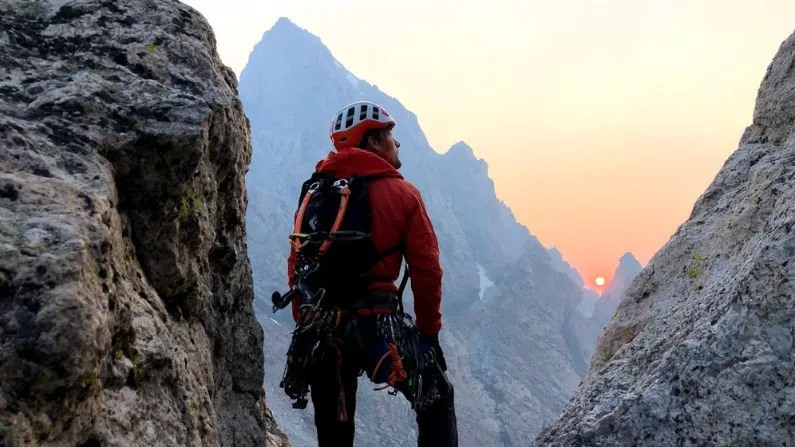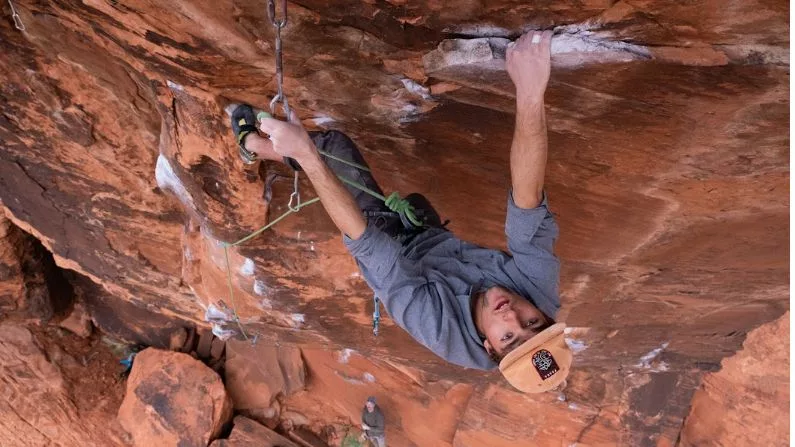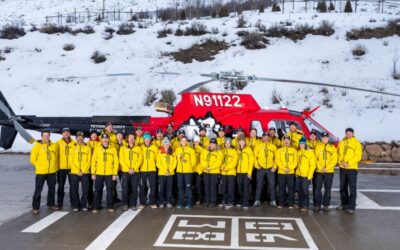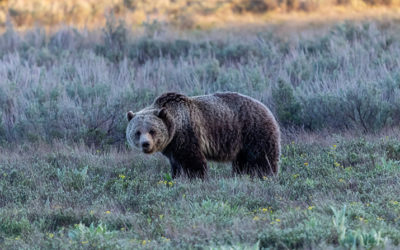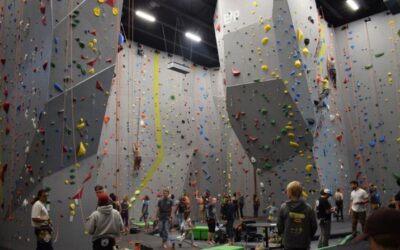A new rock climbing competition reality TV show released earlier this year features 10 climbers from around the world, including Brazil, Scotland – and Wyoming.
Brad Burns, now 23, from the town of Story, in north-central Wyoming, was just 21 when he was encouraged to apply to compete in “The Climb” from HBO Max. The show was executive produced by professional rock climber Chris Sharma and actor Jason Momoa, and it showcases the amateur climbers competing for a $100,000 prize and a one-year sponsorship from the outdoor clothing brand prAna.
KHOL contributor and former news director Kyle Mackie spoke to Burns about his experience filming the show and local climbing advocacy near his hometown.
The following interview transcript has been edited for clarity and brevity.
KYLE MACKIE: Brad Burns, thank you so much for joining us today on KHOL.
BRAD BURNS: Yeah, thanks for having me.
MACKIE: Let’s start by talking about your experience on “The Climb.” How did you find out about the show and what motivated you to apply?
BURNS: Yeah, so I was out climbing one day and got home kind of late and found this email in my inbox that I thought was spam. This email was like, ‘Hey, we saw your social media. We think you’d be great for this TV show for HBO Max.’ So it was like, ‘Oh, this can’t be real.’ But I opened it, and I ended up filling out the application, and then the next day I got a phone call and had like a two-hour-long interview. This was like probably August of my last year of undergrad, just before I started school. And then higher-ups and higher-ups just kept getting in on the meetings. And then finally I ended up going to Spain, to Mallorca in, I think, late October of 2021.
MACKIE: Well, you mentioned balancing your senior year of college while you were, I guess, in the application process and then actually while you were filming the show in Spain. And I wonder how you balanced that mental and physical toll. I mean, for folks who haven’t seen the show, all of the climbs that you were doing are really hard climb. So, we’re talking like hard 5.11s, 5.12s and even some 5.13s. How did you balance that?
BURNS: It was hard. Yeah, I’m not going to lie. I was finishing my last year at Montana State [University], and so I was doing everything online. I was really, really lucky – all my professors were really accommodating and it was kind of right post-pandemic, and so I was able to do a lot of my coursework online. But there’s an eight-hour time change [between Montana and Spain]. And we had to be live for some of those quizzes and some of those exams and things like that. And so, for me, a lot of the time that was like really early morning in Spain. So, we would like shoot all day, you know, I would rock climb and get super tired and then I would go to sleep for a couple of hours and then wake up at like 2 or 3 a.m., take quizzes, take tests and things like that. And it wasn’t the easiest thing, but I think it was worth it for sure.
MACKIE: So, we are not going to reveal in this conversation how things exactly went for you in the show. Folks can watch if they’re interested. But I do have to ask about what it was like to climb in front of Chris Sharma, who is widely considered to be one of the best rock climbers in the world. You know, what was it like to essentially try to perform your best in front of him? He’s one of the creators and a judge on the show.
BURNS: I think at first when I first met him, I was kind of nervous and everything. But honestly, I feel like I’m a somewhat laid back person. And so it was really awesome to get to climb in front of him. After meeting him the first time, it didn’t really, like add any pressure. In fact, I honestly think climbing in front of Chris and climbing in front of [the other host] Meagan [Martin] and climbing in front of the other participants, I really like to have that energy when I’m climbing. I like when people are loud. I like when people are cheering me on. And so, I think just like the more people that were there, even if they’re important people, you know, it just kind of like, makes me climb better. I think I just operate well underneath that pressure.
MACKIE: Yeah. And Meagan, who you mentioned, Meagan Martin, is another professional climber and judge on the show. I will say as a climber myself, that part felt really authentic – watching how the climbers and the competitors, you really supported each other and everybody was cheering each other on, even when you were maybe competing against each other, you know, in an elimination climb. Does that ring true to you? I mean, it seemed like a nice community.
BURNS: Yeah, 100%. I think that’s what sets this reality TV show apart from other reality TV shows. We were 100% supportive of each other. Nobody wanted anybody else to go home. Like, everybody was best friends. I mean, we basically lived together for multiple months too. So, we all got along really well. And it really is a reflection of the rock climbing community because even though it’s an elimination competition, you know, rock climbing is a very individual sport. You’re not really competing against anybody else unless you’re, you know, doing comp climbing in gyms. It’s really about like you and your belayer and your friends going out there and like doing battle against the rock and having a good time, you know? And so, I think that shines through.
MACKIE: Well there’s lots of folks here in the Tetons who are climbers. And I wanted to ask you – I think at some point in the show, they showed a photo of you climbing in the Tetons, correct me if I’m wrong – but I wanted to ask you about your local climbing experience here in this part of western Wyoming and if you have any favorite Teton memories?
BURNS: Yeah. Oh, man. I love the Tetons for sure. The Grand Teton, I climbed – I actually have a tattoo of the Grand Teton on my back. It was like one of the first big missions that I ever went on. Although it’s like technically not that difficult, it’s a big mountain, you know, there’s weather and, yeah, it’s like a serious thing up there. My favorite Teton memory… we climbed the northwest ice couloir on the Middle Teton, which is like this 1,200-foot ice route kind of on the north face of the Middle Teton, which is adjacent to the Grand Teton. And you just get views of the Grand the whole time. And it was like the middle of July and we’re ice climbing. And it’s just beautiful. Yeah, just great memories all around out there.
MACKIE: I understand you’re also president of the Bighorn Climbers’ Coalition, and that group keeps an eye on climbing issues in the Bighorn Mountains and [Bighorn] Basin, which includes popular climbing areas like Ten Sleep [Canyon]. What kind of things have you been working on? What kind of issues have come up in that role?
BURNS: So, a lot of what we do is mostly teaching and education. So, things about like stewardship. A lot of people come from Colorado or Utah and maybe Ten Sleep is their first outdoor climbing experience. Sometimes those people have never really camped outside or don’t know what it means to like, clean up at the crag or, you know, where to leave your bags at the crag. And so, a lot of what we try to do is work with the Access Fund [and] the Bighorn National Forest and just try to get information out there. That way, climbers can like reference things. There’s kind of a lot going on with development and things like that in the canyon; I won’t really dive into that. But [we] educate climbers on the best practices of what development looks like, what rebolting looks like. We also put on events like our Ten Sleep Climbers’ Festival. And then lastly, I think the last thing that we do, is we work with land managers to provide and protect climbing access. And so, we mediate these conversations between climbers and non-climbers and the landowners to make sure that we can climb in those areas for now and into the future.
MACKIE: So, I wanted to close by asking you to reflect a bit on climbing and the sport that you’ve dedicated so much of your life to. There’s this famous Yvon Chouinard quote about how climbers are “conquistadors of the useless.” And I just wanted to ask you to reflect on what climbing means to you and how you think it’s going to fit into your life moving forward.
BURNS: Climbing will always be a way to connect with people, and a way to connect with nature. I think regardless of how much I’m climbing, it’s just always good to get out – just you and your friends and kind of getting back to that non-competitive nature; It doesn’t matter how you’re doing, you know, it’s all about just like getting out there, having fun, enjoying these beautiful spaces that are all around us, from the Tetons to Devil’s Tower to the Bighorns. There’s just so much awesome green space around here, and climbing is just an awesome medium to explore that, and a good way to challenge yourself and just connect with people. And I think climbing has always been that for me and I think it will just always continue to be that way for me.
MACKIE: After your experience on “The Climb,” do you think you’d ever do another climbing competition again?
BURNS: Oh yeah! I mean, it’s like a paid trip to Spain, you know? Man, I can’t even express how awesome it was. I feel so humbled and so lucky to have been a part of that experience because it’s like, I mean they could have chosen so many different people and somehow they chose like a small boy from Wyoming. You know, I don’t really get how it works, but yeah, I would absolutely do something like that again.
MACKIE: Alright, well, Brad, thank you so much for taking the time. It’s been a pleasure to chat with you.
BURNS: Yeah, of course. Thank you so much for having me. Appreciate it.

